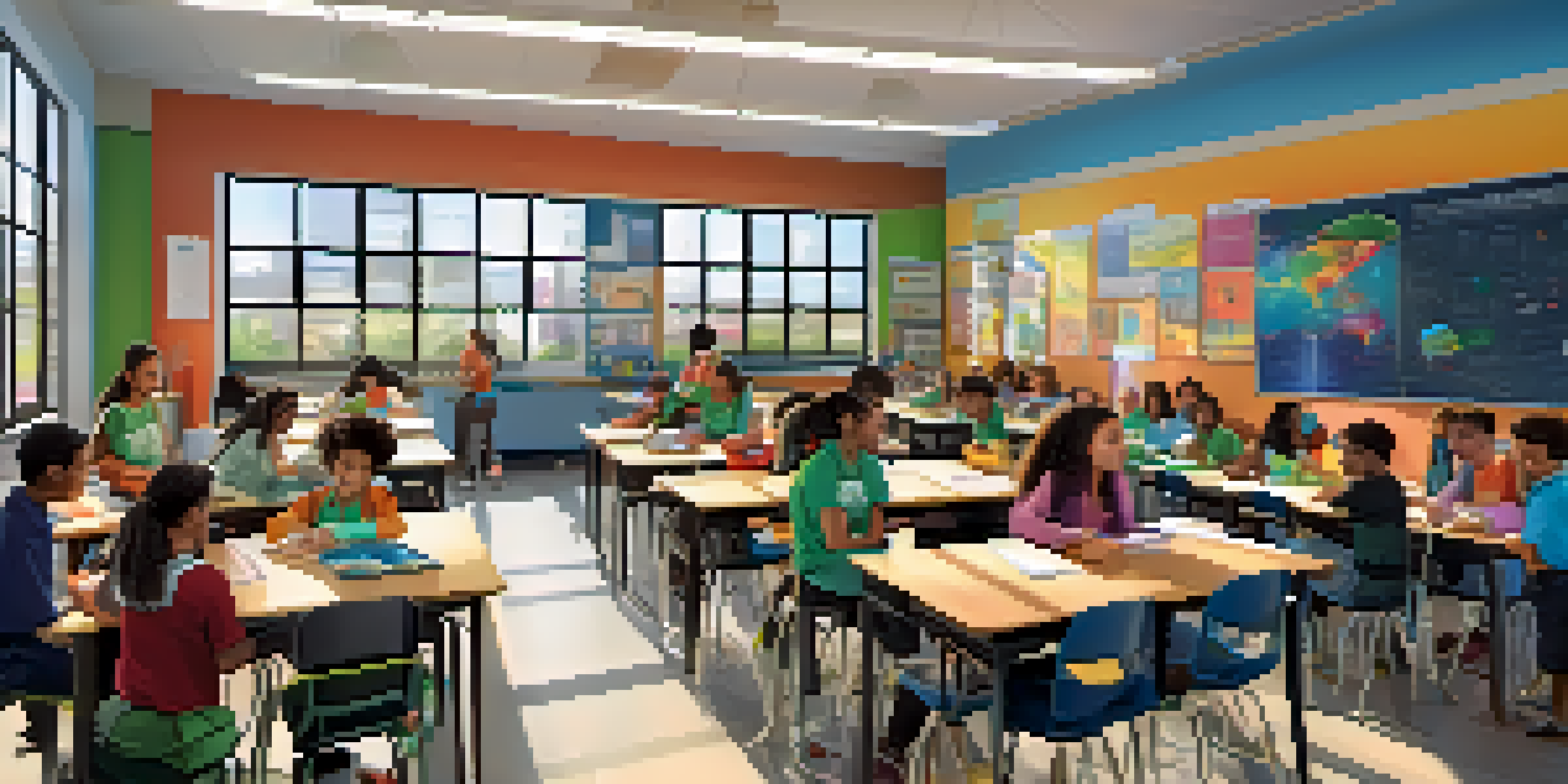The Impact of Charter Schools on Detroit's Education System

Understanding Charter Schools in Detroit's Education Landscape
Charter schools have become a significant part of Detroit's education system, offering an alternative to traditional public schools. These schools operate independently of the local school district, which allows for more flexibility in their curriculum and teaching methods. This independence can lead to innovative educational approaches, tailored to meet the diverse needs of students in Detroit.
Education is the most powerful weapon which you can use to change the world.
Since their inception, charter schools have attracted a considerable number of students and families seeking different educational experiences. Parents often view charter schools as a solution to the challenges posed by underperforming district schools. This growing interest has sparked a broader conversation about educational choice and its implications for the community.
As we explore the impact of charter schools, it's essential to understand both their potential benefits and drawbacks. While they offer unique opportunities for students, they also raise questions about funding, accessibility, and overall effectiveness within the larger education system.
The Rise of Charter Schools in Detroit
Charter schools have seen a dramatic rise in Detroit, particularly over the past two decades. Their growth can be attributed to various factors, including parental demand for better educational options and the perceived failures of traditional public schools. This shift has led to a dynamic education ecosystem, with families actively seeking schools that best fit their children’s needs.

In many cases, charter schools have emerged in areas where public schools struggled, stepping in to fill a gap in quality education. They often emphasize specialized programs, including STEM, arts, and language immersion, which can attract a diverse student population. This diversification of educational offerings can be seen as a positive development for families in Detroit.
Charter Schools Offer Flexibility
Charter schools in Detroit provide independent educational options, allowing for innovative curricula tailored to diverse student needs.
However, this rapid expansion has also generated a mixed response from the community. While some celebrate the increased choices, others express concerns about the potential fragmentation of the education system and the impact on traditional public schools.
Charter Schools vs. Traditional Public Schools: A Comparison
When comparing charter schools to traditional public schools, several key differences emerge. Charter schools typically have greater autonomy in their operations, which allows them to implement innovative teaching techniques and curricula. This flexibility can lead to unique educational experiences that may better cater to student interests and learning styles.
The only way to do great work is to love what you do.
On the other hand, traditional public schools are required to follow state guidelines and regulations, which can limit their ability to adapt quickly to changing educational needs. This structure can sometimes hinder innovation and responsiveness, especially in a rapidly evolving educational landscape like Detroit's.
Both types of schools have their merits, but the effectiveness often hinges on individual school leadership, teaching staff, and community involvement. Ultimately, the choice between charter and traditional schools should be informed by a family's specific educational goals and their child's unique needs.
The Role of Funding in Charter School Success
Funding is a crucial factor in determining the success of charter schools in Detroit. Unlike traditional public schools, which receive funding based on enrollment and state allocations, charter schools often rely on a mix of public and private funding sources. This variability can lead to disparities in resources and support for different charter schools.
Some charter schools thrive with robust funding, allowing them to provide excellent facilities, advanced technology, and extracurricular programs. In contrast, others may struggle to meet basic operational needs, impacting the quality of education offered. These funding challenges highlight the importance of equitable resource distribution in ensuring all students receive a high-quality education.
Funding Disparities Impact Quality
The success of charter schools is heavily influenced by varying funding sources, leading to discrepancies in resources and educational outcomes.
Furthermore, as charter schools continue to grow, the conversation around funding becomes increasingly critical. Stakeholders must work together to create a more sustainable and equitable funding model that supports all educational institutions in Detroit.
Academic Performance: Charter Schools in Context
Assessing the academic performance of charter schools in Detroit reveals a complex picture. Some studies indicate that charter schools have outperformed their traditional counterparts in specific areas, particularly in math and reading proficiency. These successes can often be attributed to focused curricula and targeted interventions designed to help struggling students.
However, not all charter schools yield the same results, and performance can vary significantly between institutions. Critics argue that the lack of accountability and oversight in some charter schools can lead to subpar educational outcomes. This inconsistency underscores the importance of ongoing evaluation and assessment within the charter school system.
Ultimately, the academic performance of charter schools should be viewed within the broader context of Detroit’s educational challenges. While some schools demonstrate promising results, the overarching goal must remain to provide quality education for every student, regardless of the school type.
Community Impact: Charter Schools and Local Engagement
The presence of charter schools in Detroit has sparked significant community engagement and dialogue around education. Many charter schools actively involve parents and community members in school decisions, creating a collaborative environment that fosters investment in student success. This level of engagement can strengthen community ties and create a supportive network for families.
Furthermore, charter schools often focus on addressing specific community needs, such as cultural education or after-school programs. By tailoring their offerings to the unique demographics and challenges of their neighborhoods, charter schools can play a vital role in fostering a sense of belonging and empowerment among students and families.
Community Engagement is Key
Charter schools foster community involvement, but it's essential to ensure collaboration includes all families, particularly those in traditional public schools.
However, this community involvement can also bring about tensions, particularly among families whose children attend traditional public schools. As charter schools continue to grow, fostering open and inclusive dialogue among all stakeholders will be key to building a cohesive educational community.
Future Considerations for Charter Schools in Detroit
As Detroit's education landscape evolves, it's essential to consider the future of charter schools in the city. Continued collaboration among educators, policymakers, and community members will be crucial in addressing the challenges and opportunities that lie ahead. This teamwork can help ensure that all students—regardless of the type of school they attend—receive a high-quality education.
Moreover, the ongoing conversation about educational equity will need to remain a priority. As charter schools expand, it's vital to monitor their impact on traditional public schools and ensure that resources and opportunities are equitably distributed. This balance will help maintain a healthy educational ecosystem that benefits all students.

Ultimately, the future of charter schools in Detroit will depend on their ability to adapt and respond to the ever-changing needs of the community. By remaining focused on student success and fostering collaboration, charter schools can continue to play a meaningful role in shaping the city's educational landscape.